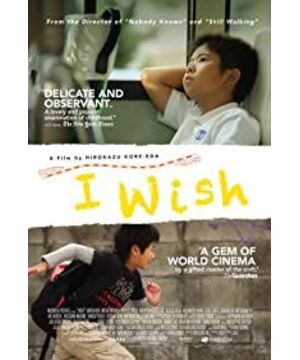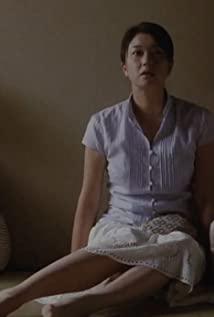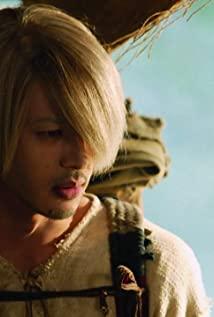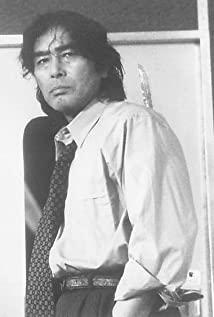On March 12, 2011, the Kyushu Shinkansen in Japan opened to traffic. The Japan Railway Group plans to shoot a feature film about the Shinkansen as a souvenir.
The director is Hirokazu-eda who is good at portraying the complex and delicate family relationships of East Asian culture.
Representative works: "Walking Nonstop", "Deeper Than the Sea", "Like Father Like Son", "No One Knows", etc. In 2018, he won the Palme d'Or at the 71st Cannes International Film Festival for "The Thief's Family".
The propositional composition "Miracle" is Hirokazu Koreeda who still chooses family as the starting point, or a familiar formula. But this film does not have the heaviness more or less shown in the director's previous works.
01 Brother
Hang Yi and Ryunosuke are brothers. Their parents divorced and separated. The older brother Hang Yi moved with his mother to his grandparents' house in Kagoshima, and the younger brother Ryu Nosuke lives in Fukuoka with his father who dreams of music. The two brothers have very different personalities.
The older brother Hang Yi is mature and restrained, a little adult who attaches great importance to feelings.
The air in Kagoshima is always full of volcanic ash, which often stains the room; the school is built on the top of the mountain and it is always difficult to walk up, all of which make Hangichi feel difficult to adapt to, and miss the days when his family is together even more. When I saw my classmate's mother and brother in swimming class, I suddenly became stunned. I heard that the tower of the park where the family of four often went was going to be demolished, so I called my brother to miss it.
Desperately hoping that his parents could reunite, he was heartbroken for this family. While paying close attention to the movements of the mother who participated in the class reunion, fearing that the old relationship between her mother and her old classmate would rekindle, she asked her brother and father if he had made a new girlfriend.
And his younger brother Ryunosuke is a free and easy, independent, Buddhist optimist. Grow your own vegetables in the yard, get up in the morning to water the seedlings and pick fresh tomatoes to eat. After drying the clothes, I called my dad to get up, tidied up everything and went out, and then took a large bag of garbage with me. A series of actions in one go.
Mom asked, I heard you had a good time? Ryunosuke replied: Because I work hard to be happy!
Ryunosuke seems to be carefree, but he also has a careful and considerate side. For example, he always takes what his brother said to heart and remembers his mother's preferences.
The two have completely different expectations for their parental relationship.
In Hang Yi's dream, the family had a happy picnic in the park, just like in the dream to prevent the workers from dismantling the tower, Hang Yi also wanted to prevent the family from being dismantled.
In Ryunosuke's dream, his parents quarreled at the dinner table because of their disagreements. He doesn't want his parents to get back together.
Hangichi accidentally heard that the Shinkansen between Kagoshima and Hakata had just opened. When the first trains from the two places crossed each other, a miracle will happen, and the wishes of those who witnessed this moment will come true.
Hangichi told his younger brother about this, and agreed to meet in Kumamoto where the trains meet. So the two people with different wishes took their little friends to embark on a journey to realize their dreams with twists and turns.
02 Family
It is Hirokazu Kore-eda who is probably the most proficient director of family films in Asia today. He is good at capturing real and tiny details with his camera lens, and only a few brushstrokes can delineate the emotions delicately and movingly.
What is affection like? Family love will break out into quarrels, and the mouth will not choose words. But it will also disregard the past and reunite.
Koichi's wish is for a volcanic eruption in Kagoshima so that people have to move out and the family can live together again. The younger brother felt that the elder brother's thoughts were selfish. The elder brother thinks that the younger brother only cares about his own happiness, and the family is not important to him at all.
The two brothers had the fiercest feud ever. But after the quarrel, the younger brother who didn't care about it still took the initiative to call his brother to admit his mistake under the guidance of a friend, and the arrogant and cold brother was still willing to leave the best potato chip residue to his younger brother.
Family affection is an indescribable concern and concern, such as fear of being forgotten, fear of being hated. But understand that family is always family.
It was the drunk mother who held back her tears and blurted out: Don't you want to see your mother? Why don't you say you want to see me? It's the little sensitivity hidden under Ryunosuke's seemingly detached appearance: Mom thinks I'm the same as Dad, so I think Mom may not like me. It was the mother who finally couldn't help crying when she heard this, "It's not like this". It was my grandmother's heartfelt words, "You have to remember that you will always be my grandson."
There was also a small episode during the trip. The brothers and their friends had no place to stay at night, and were taken in by a pair of kind grandparents by accident. Ryunosuke's friend Emi looks a lot like their daughter. Their daughters did not want to stay in their hometown and never came back after they left. Emi and her mother also have similar conflicts. Emi is a child star who hopes to go to Tokyo to be an actress one day, but her mother who has traveled this road does not support her.
After returning from this trip, Emi said to her mother
Family love is that there are differences with each other and their own persistence, but I still love you.
03 world
There is a seemingly grand word in the film that is repeatedly mentioned - the world . This seems to be contrary to Hirokazu Koreeda's daily creative concept of focusing on the little people in trivial life. Dad said to Hang Yi that he hoped he could see the world, and Hang Yi asked what the world was. Dad said you'll understand sooner or later.
Until everyone came to the tunnel where you could see the trains meet, at the moment when the two trains met, Hang Yi understood what the world was. Here is Hirokazu Kore-eda answering that question through a set of wonderful empty mirrors, which also pushes the whole film to a climax.
For more than a minute, each and every minute footage was too poignant. A bite of a popsicle, potato chips in a bag, a 40.1° thermometer, a paint tray with a painting, a school uniform with a name on it, a meal made by my mother, swimming trunks floating in the pool, and a blue sky covered with white clouds. , the seedlings breaking ground in the yard, the puppy lying quietly in the bag, the dancing hands of the grandmother, the light soup made by the grandfather, the encouragement of the teacher, the autumn cherry blossoms in full bloom, and a group photo of the younger brother.
This is the world of Air One. It is also the world that Hirokazu Kore-eda understands, and it is not grand. In other words, we must first see its insignificance before we can truly appreciate its grandeur. Everyone's world is a flowing fragment of life. Although it is not easy to detect, it is like the silent spring rain that moistens things and waters the concrete us.
In the end, Hang Yi did not make the wish of a volcanic eruption, because he understood that this kind of daily life is his own world and the world of others, and his wish will destroy the world of others. Because I cherish my own small world, I am in awe of the larger world made up of countless people. He told his younger brother that he still chose the world between family and the world. This is the unsurprising but particularly moving growth of an ordinary child in an ordinary life.
04 I Wish
The English name of the film is "I wish", which is an echo of "Miracle". Are there miracles in the world? Possibly, but very rarely. There is always a distance between desire and reality. Backfires are the norm in life.
There is a particularly interesting segment in the film. The children have been thinking about Kumamoto's horse meat sashimi after hearing that it is delicious. However, in the end, I did not eat the horse meat sashimi I was thinking of. But in the car on the way home, they were relishing a box of biscuits, which the camera gave a close-up: horsemeat sashimi-flavored biscuits.
Wish and reality are like horse sashimi and horse sashimi-flavored biscuits in movies. The cruelty of life is that it often doesn't give you the horsemeat sashimi you want, but a little cuteness is that it might give you a box of horsemeat sashimi-flavored biscuits. It was Hirokazu-eda who had a special preference for the occasional beauty like horse meat sashimi biscuits. He once said: "I don't like plots where the protagonist overcomes his weaknesses, protects his family, and saves the world. Instead, I want to describe the moment when heroes don't exist, and only ordinary people live in a somewhat dirty world that suddenly shows beauty."
For example, my grandfather's hand-made light soup was gradually eliminated by the times, and the hope of reopening the store was very slim, but my grandson liked this light taste.
The grandparents' daughter still didn't go home, but she met Emi who looked exactly like her daughter in a dream. The noisy children brought laughter to the family. So when asked if they had a wish, they said this
Life takes a lot and leaves something behind as a small compensation. Compared with the miracles that I don't know if they can be realized, perhaps more precious is the crystal clear sincerity hidden behind the wishes that have been spoken and unsaid, the wishes that have changed and those that have not changed.
View more about I Wish reviews











